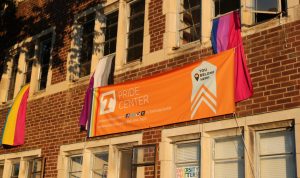“When folks look back in a few years and [ask], ‘When did government take over academia? When did they have power and control in the life of state universities?’ — this is the example. Sex Week is the example. ODI is the example. Pride Center is the example. And it’s not just an isolated example . . . They have a playbook. They’re doing this all over the country.”
— Donna Braquet, former director of the Pride Center
AUGUST 2010 – DECEMBER 2015
The fiercest battle over intellectual freedom in recent years began with a battle over words.
In February 2010, after sustained lobbying from the campus’ LGBT Commission, the University opened the LGBT Outreach Center, which was subsequently renamed and reopened as the Pride Center. Two years later, the University appointed Rickey Hall to be the first Vice Chancellor for an Office of Diversity & Inclusion (ODI). The Pride Center received University funding to pay the director, Donna Braquet, as well as graduate student employees.
In August 2015, the same month that the LGBT Outreach Center was reopened as the Pride Center, the Vice Chancellor asked the Center’s director, Donna Braquet, to write a short “best practices” piece on gender-neutral pronouns. This 400-word post was immediately picked up by various media outlets, some of whom misconstrued the post as part of an effort to censor language by “ban[ning] ‘gender based pronouns” such as “he” and “she.” (As its Vice Chancellor repeatedly noted, ODI never made any attempt to enforce the use of gender-neutral pronouns.) The University subsequently removed the post. The debate escalated in December of that year, when the Office of Diversity and Inclusion (ODI) sent out a memo requesting — but not demanding — that departments be sensitive to religious diversity at end-of-the-semester holiday parties.
In the clip below, Donna Braquet, the now-former director of the Pride Center, discusses the origins of the Pride Center, the services it provided to campus, and the history behind the “gender neutral” pronouns piece of August 2015. (12/9/16)
SPRING 2016
In the 2016 legislative session, the legislature responded with a bill that redirected all of ODI’s yearly budget toward scholarships for minority engineering students. (The original bill had redirected the funds to police-car decals saying “In God We Trust.”) The bill also stipulated that no state funding could be provided “to promote the use of gender-neutral pronouns, to promote or inhibit the celebration of religious holidays, or to fund or support Sex Week.” The bill passed in May 2016, shutting down the Office of Diversity and Inclusion. That same month, the University administration de-funded the Pride Center and fired Donna Braquet as its director.
EVENTS IN SPRING 2017
In spring 2017, the legislature proposed that the University redirect the former ODI budget toward an “Office of Intellectual Diversity” at UT. This proposal allegedly came in response to several students complaining that they did not feel comfortable expressing their conservative viewpoints in the classroom.
On July 1, 2017, the previous year’s bill expired, and funding for “Diversity” — but not for the Office of Diversity and Inclusion — resumed. Shortly thereafter, Chancellor Beverly Davenport announced that a portion of the Diversity budget would be allocated for hiring a new director at the Pride Center.
___________________________________________________________________________
LINKS FOR FURTHER READING
Diversity & Inclusion Benchmarks – Timeline of D&I at UT
“University of Tennessee Funding Bill Allowed to Become Law.”
“University of Tennessee diversity funding coming back, but no plans on how to spend it.”
“Editorial: University diversity funding back, but for what?”